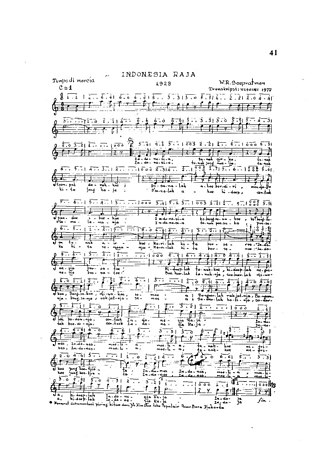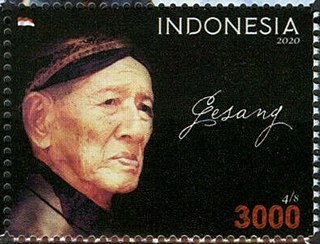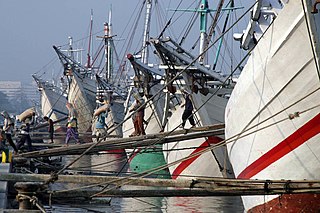Related Research Articles

"Indonesia Raya" is the national anthem of Indonesia. It has been the national anthem since the Proclamation of Indonesian Independence on 17 August 1945. The song was introduced by its composer, Wage Rudolf Supratman, on 28 October 1928 during the Youth Pledge in Jakarta. The song marked the birth of the archipelago nationalist movement in Indonesia that aims to gain independence from Dutch colonial rule. The first newspaper to openly publish the musical notation and lyrics of "Indonesia Raya"—an act of defiance towards the Dutch authorities—was the Chinese Indonesian weekly Sin Po.
A roots revival is a trend which includes young performers popularizing the traditional musical styles of their ancestors. Often, roots revivals include an addition of newly composed songs with socially and politically aware lyrics, as well as a general modernization of the folk sound.
The music of Finland can be roughly divided into folk music, classical and contemporary art music, and contemporary popular music.

Indonesia is a country with many different tribes and ethnic groups, and its music is also very diverse, coming in hundreds of different forms and styles. Every region has its own culture and art, and as a result traditional music from area to area also uniquely differs from one another. For example, each traditional type of music is often accompanied by its very own dance and theatre. Contemporary music scene have also been heavily shaped by various foreign influences, such as America, Britain, Japan, Korea, and India.
An interval signal, or tuning signal, is a characteristic sound or musical phrase used in international broadcasting, numbers stations, and by some domestic broadcasters, played before commencement or during breaks in transmission, but most commonly between programs in different languages.
"Terang Bulan" is a traditional Malay song. This song is an adaptation based on The state anthem of Perak named "Allah Lanjutkan Usia Sultan" which translates to "God Lengthen the Sultan's Age". The song's melody was originally from "La Rosalie", a popular song in the Seychelles in the 19th century compose by French lyricist Pierre Jean de Béranger (1780-1857).

"Farewell of Slavianka" is a Russian patriotic march, written by the composer Vasily Agapkin in honor of Slavic women accompanying their husbands in the First Balkan War. The march was written and premiered in Tambov in the end of 1912. In the summer of 1915, it was released as a gramophone single in Kyiv. Slavianka translates to 'Slavic woman'.
"May There Always Be Sunshine" is a popular Soviet children's song created in 1962. The music was composed by Arkady Ostrovsky and the lyrics written by Lev Oshanin. Korney Chukovsky, a writer and immensely popular children's poet, later wrote that the inspiration for the song had been the four lines of the refrain, which were composed in 1928 by the four-year-old boy Kostya Barannikov.
"Bengawan Solo" is an Indonesian song written by Gesang Martohartono in 1940. The song is a description of the longest river in Java, Solo River. The song became popular in Indonesia during the Second World War and was one of the songs promoted nationally in the newly-independent country after the war.
"Nu tändas tusen juleljus" is a Christian traditional Swedish language Christmas song, written in 1898 by the Swedish song text writer Emmy Köhler. Translated into English, the title literally means "Now are lit a thousand Christmas candles". The theme of the song is the gospel of the newborn Christ and specifically its aspects of domestic harmony and inner peace, brought by the lights of candles as well as of the stars above, most importantly the star of Bethlehem. It was one of the most popular Christmas songs in Sweden during the 20th century, in churches, homes and schools. Swedish pop singer Agnetha Fältskog recorded the song on her album "Nu tändas tusen juleljus", named after the song, with her daughter Linda Ulvaeus.

Gesang Martohartono was an Indonesian singer-songwriter from central Java. He is the composer of the "Bengawan Solo," famous song throughout Indonesia, Japan, part of Asia, and some other countries. The song is almost synonymous with the kroncong style of Javanese music. Martohartono was most commonly known simply as Gesang.

Nasi dagang is a Malaysian dish consisting of rice steamed in coconut milk, fish curry and extra ingredients such as pickled cucumber and carrots.

Ismail Marzuki was an Indonesian composer, songwriter and musician who wrote around 202 to 240 songs between 1931 and 1958, including numerous popular patriotic songs. Among his best-known works are "Halo, Halo Bandung", "Gugur Bunga", and "Rayuan Pulau Kelapa". In 1968, he was honoured with the creation of the well-known Taman Ismail Marzuki which is a cultural centre in Menteng in central Jakarta. In 2004 he was declared one of the National Heroes of Indonesia.

Sunda Kelapa is the old port of Jakarta, located on the estuary of the Ciliwung River. "Sunda Kalapa" is the original name, and it was the main port of the Sunda Kingdom. The port is situated in Penjaringan District, of North Jakarta, Indonesia. Today the old port only accommodates pinisi, a traditional two-masted wooden sailing ship providing inter-island freight service in the archipelago. Although it is now only a minor port, Jakarta has its origins in Sunda Kelapa and it played a significant role in the city's development. The port is currently operated by the state-owned Indonesia Port Corporations.
"Gugur Bunga di Taman Bakti", better known as "Gugur Bunga", is an Indonesian patriotic song written by Ismail Marzuki in 1945. Written to honor the Indonesian soldiers killed during the Indonesian National Revolution, it tells of the death of a soldier, and the singer's feelings. It has since become a common song for protests and funerals. The song's line gugur satu, tumbuh seribu has entered common Indonesian vernacular.

The Thousand Islands are a chain of islands to the north of Jakarta's coast. It forms the only regency of Special Capital Region of Jakarta, the metropolitan province of Indonesia. It consists of a string of 342 islands stretching 45 km (28 mi) north into the Java Sea at West Jakarta Bay and in fact are located to the north of Banten Province. Pramuka Island is the regency seat. The islands, along with North Jakarta City, are the only administrative divisions of Jakarta Special Capital Region with a coastline.

Macapuno also called coconut sport, is a naturally occurring coconut cultivar which has an abnormal development of the endosperm. The result of this abnormal development is a soft translucent jelly-like flesh that fills almost the entire central cavity of coconut seeds, with little to no coconut water.
Halo, Halo Bandung is an Indonesian patriotic song written by Ismail Marzuki that describes the spirit of the struggle of the people of the city of Bandung in the post-independence period in 1946, particularly in the Bandung Sea of Fire that occurred on March 23, 1946.

Gordon Lumban Tobing was an Indonesian singer of folk songs, particularly those in the Batak language. Born to a Batak family in Medan, North Sumatra, Tobing moved to Jakarta in 1950 and began working in the entertainment industry. While with Radio Republik Indonesia, he participated in an Indonesian cultural envoy to the 4th World Festival of Youth and Students. Over the remainder of his life Tobing was included in numerous similar envoys, ultimately travelling to five continents.
References
- ↑ Composer and lyrics: The Gallery of Indonesian Songs - Rayuan Pulau Kelapa. Retrieved on March 27, 2008.
- ↑ Post-independence patriotic song: PDF file at the Soli-Deo.com website. Retrieved on March 27, 2008.
- ↑ P, Timotius (16 August 2023). ""Rayuan Pulau Kelapa", Nota Kekaguman Ismail Marzuki untuk Indonesia". CXO Media (in Indonesian). Retrieved 2024-07-26.
- ↑ "Ismail Marzuki - Rayuan Pulau Kelapa (English translation)". lyricstranslate.com. Retrieved 2024-07-26.
- ↑ Ardjo, Irawati Durban (2012). "New Sundanese dance for New Stages". In Jennifer Lindsay; Maya H.T. Liem (eds.). Heirs to World Culture: Being Indonesian, 1950-1965. Leiden: KITLV Press. p. 212. ISBN 978-90-6718-379-6.
- ↑ Rayuan Pulau Kelapa // Погадаев, В. Малайский мир (Бруней, Индонезия, Малайзия, Сингапур). Лингвострановедческий словарь (Malay World. Brunei, Indonesia, Malaysia, Singapore. Lingua-Cultural Dictionary). М.:"Восточная книга", 2012, с.548
- ↑ "Siihen aikaan kun radioaallot Saarenmaan valssin suomalaisten suosikkilevyksi lennättivät" (in Finnish). Estofennia. November 15, 2021. Retrieved November 16, 2021.
- ↑ Kevin, Elang Pangeran (November 10, 2021). "Bawa Nuansa Nostalgia, Ini Lirik Lagu Ismail Marzuki, Rayuan Pulau Kelapa Bahasa Belanda" (in Indonesian). About Malang. Retrieved July 21, 2022.
- ↑ Media use of the song: WorldOfRadio.com website. Retrieved on March 27, 2008.